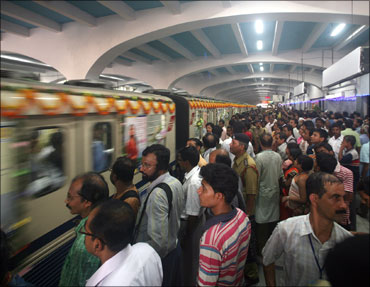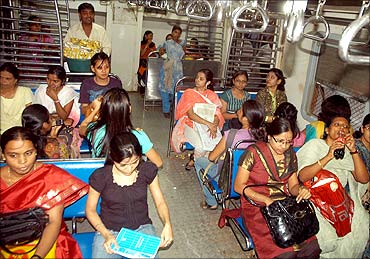 | « Back to article | Print this article |
What Indian Railways needs to do for revival
India's railways are in a mess, in terms of both finances and safety.
A series of recent accidents draws attention to the decline of the Indian Railways compared to its Asian counterparts, thanks to more than a decade of political interference, populism, corruption and inadequate investment.
The appointment of a new railway minister should provide an opportunity for a turnaround if the new minister decides to be a modern, forward-looking manager rather than a political hanger-on fulfilling the bidding of various vested interests.
Of all the Cabinet appointments the prime minister is going to make, the more important ones will be in the railways.
Click NEXT to read on . . .
What Indian Railways needs to do for revival
Hopefully, he will find an able leader who can first give it some oxygen and then put it on a health regimen to regain financial muscle and energetic performance.
In a way the finances and safety record are related. If an organisation is ably led, it is likely to do well financially and also prevent major accidents, over 60 per cent of which are caused by human error.
A well-run organisation will also, in all likelihood, give a good account on the punctuality front. In fact, this issue gives us an idea of how deep the rot in the organisation is -- even official statistics cannot be taken seriously.
Against mountainous anecdotal evidence that trains seldom run on time, official statistics claim that the national carrier is on time 90 per cent of the time year after year! If this is the state of punctuality statistics, one can well imagine the state of accident statistics?
Click NEXT to read on . . .
What Indian Railways needs to do for revival
On the issue of accidents, those that occur at level crossings need to be highlighted. The unspoken attitude of the railway establishment is that "these are beyond our control and not for us to share the blame for".
There is a need to work out a joint programme with a couple of local panchayats which use every level crossing to be guarded day and night by villagers who know that the fate of their people depends on their vigilance. The wages for the guards can come from the rural employment programme.
If the Indian Railways has already been working along these lines then a white paper to inform everyone would do wonders, particularly since there has been no impact so far. Two level crossing tragedies have occurred recently.
Click NEXT to read on . . .
What Indian Railways needs to do for revival
Improving the state of the railways requires no rocket science. Basic housekeeping has to improve vastly. Upgradation and modernisation of infrastructure and services must go hand in hand with organisational reform. In the week the Indian Railways was dealing with accidents, China Rail launched a superfast service from Beijing to Shanghai that would be the envy of the developing world.
One reason for the decline of the railways could be that urban middle class Indians, especially government officials, have shifted to low-cost airlines and have lost interest in the quality of passenger rail service.
Elsewhere in the world, including China, railways are becoming popular again with upper income groups. The Indian Railways needs the return of the influential and well-heeled customer for its revival, if not survival.




